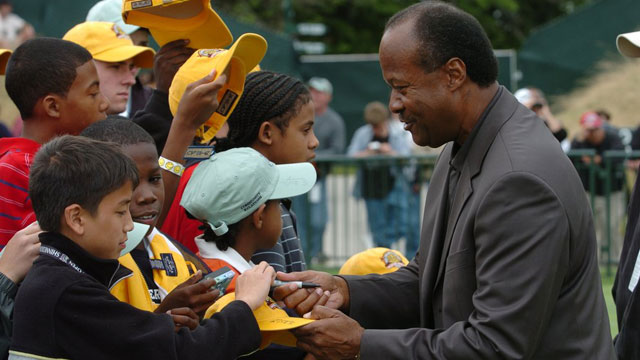NEWS
Ellison discusses role in aiding minorities and women on, off course

Editor's Note: In this 2010 interview, Earnie Ellison Jr., director of business and community relations for The PGA of America, explains his role in creating greater awareness of the benefits and opportunities for minorities and women as PGA members and in the golf industry.
Q: Discuss your position with The PGA of America and some of your responsibilities.
A: One of our goals is to provide opportunities for minorities and women to participate in the game and business of golf. I am responsible for ensuring that The PGA of America honors that commitment by creating greater awareness of the benefits and opportunities for these individuals and to ensure that the road blocks that precluded their involvement are removed.
It is like being a sales person, while at the same time managing the implementation of our inclusion initiatives. Our initiatives focus on becoming a PGA Professional, careers in golf, supplier inclusion, sponsorship and license inclusion, growing participation in playing golf and all aspects of the golf industry.
My responsibilities also include building our community image. The geography of unequal opportunities exists and it has led families and their children to rely on resources from charitable organizations for survival. Golf certainly is a key community resource.
We engage organizations within the communities where we host our spectator events and in the communities where we live. We reach within these communities and try to become part of the solution for the problems that are affecting our most precious resource -- our youth.
Q: The PGA Minority Collegiate Golf Championship has really grown since its inception. Will you talk a little bit about this great Championship?
A: The original goal of this Championship, some 23 years ago, was to provide a venue for collegiate golfers from our nation's Historically Black Colleges and Universities to compete for a national championship. The PGA of America first hosted this Championship in 1998 at PGA Golf Club in Port St Lucie, Fla. Currently, of the 105 Historically Black Colleges and Universities, 25 compete annually in the PGA Minority Collegiate Golf Championship.
We have expanded this championship to include Hispanic and Native American-serving universities, as well as minority golfers on golf teams from all universities. While we have experienced significant growth in participation, far too many of our prestigious universities do not have golf programs. We hope that more of them will start golf programs and send contestants to this annual championship. I should also note that this championship is now recognized as a feeder for employment within the golf industry because of the Business of Golf Career Expo.
Q: You were able to attend the PGA Annual Meeting where The PGA of America bestowed Membership upon late African American Golf Pioneers Ted Rhodes, John Shippen and Bill Spiller as well as honorary membership to Joe Louis. Will you talk about that experience?
A: From the original concept to the Annual Meeting, where these pioneers were honored, was an experience that I will long remember. The most amazing thing was the attitude of the pioneers' children. Each stated that their father would be honored to finally become a PGA of America member. In their minds, this represented closure to the years of being denied an opportunity for their father to pursue his dream, to be recognized as a PGA member.
It was a wonderful feeling to witness the process of The PGA making an apology for its behavior and giving these pioneers this honor. I hope this will encourage other African American golfers to pick up the baton and carry it a little further.
Certainly, challenges continue that will affect success on the professional tours and various mini tours, but the one of denial because of the color of your skin does not exist. It would be nice to have individuals on Tour today to replace Ted Rhodes, John Shippen, Bill Spiller or a celebrity like Joe Louis who leaned on his name to ensure that minority players had the resources to compete.
